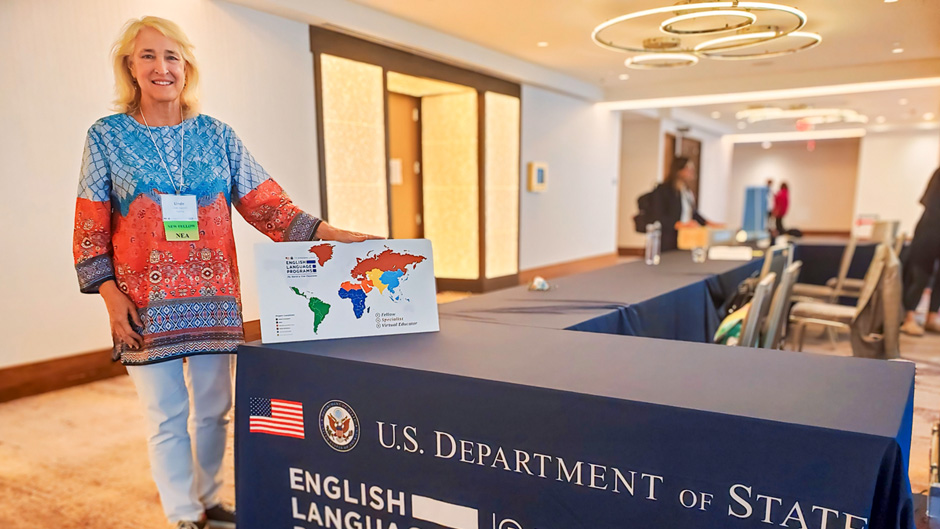One of Linde Barrett’s favorite perks as a Miami high school reading and language specialist these past two decades has been having her summers free.
An itinerant traveler, Barrett spends the summer breaks satisfying her wanderlust with travels that include crawling through tunnels on the remote Scottish Orkney Islands to see 5,000-year-old tombs with an archeologist. This past summer, the University of Miami alumna and her husband, Brian Barrett, a finance associate professor in the Miami Herbert Business School, spent five weeks touring in Romania, driving over the Carpathian Mountains to the border of Moldova and Ukraine.
This fall, Barrett is taking a leave of absence after 20 years as an educator and readying for a new adventure, one that marries her skills as a reading specialist with her love for travel. She leaves in October to serve as a cultural ambassador to Algeria through the U.S. Department of State Bureau of Educational and Cultural Affairs.
“I’m always off experiencing so much because the world is so interesting and especially to these places where you get to know the people and the cultures,” said Barrett. “I’ve always done these types of trips. Do my friends understand me? No, but it’s in my blood. I’m a little bit nomadic.”
Barrett is one of 147 program fellows who were chosen from thousands of applicants following a rigorous and competitive State Department selection process. The fellows will be dispatched to 60 countries around the world for 10-month stints. Each has a different assignment based on the customized needs of the host country. Three, including Barrett, are assigned to Algeria; the other two will be teaching 21st-century skills to English-language teachers at Algeria’s universities.
Barrett’s position is unique. Her primary duties will focus on teaching government officials career-specific vocabulary, writing, and presentation skills, along with American “honorifics”—cultural sensitivities. The officials from Algeria’s departments of culture, energy, and foreign affairs are intent on becoming proficient in English in order to attend conferences and open the North African country to tourism toward the end of this decade.
“I’m really going to have to be fluid, because my assignment as a fellow has never been done before in Algeria. It’s a Muslim country and one that’s been essentially closed to foreigners,” said Barrett, adding that her initial plans include a needs assessment with focus groups and questionnaires with government officials.
Barrett credited her degrees at the University—an M.B.A. in health administration and later an M.S. in education—with both her career success as an educator at Gulliver Preparatory School and for having been chosen for her upcoming assignment.
Under a multidisciplinary program developed by Marjorie Montague, a former University professor of special education, Barrett trained in the areas of learning disabilities and special education as well as Teaching English as a Second Language (TESOL).
Soon after graduation, Barrett began her education career at Gulliver Prep in the Academic Resource Program, where she worked one-on-one with students who needed help with executive functioning and served as a student-parent liaison. Over time, she developed a successful Inquiry and Research Design class that provided the skills for students to manage the 4,000-word extended International Baccalaureate (IB) essay.
Through her involvement with the school’s Creativity, Activity, and Service (CAS) program, Barrett mapped out a community-based service-learning curriculum that helped create international mindedness for students in the IB program.
“One of the things the State Department was really looking for were teachers especially skilled in either IB or TESOL,” Barrett noted.
Since she was selected and signed the contract several months ago, Barrett has immersed herself reading books, watching films, and learning about Algerian history. She’s traveled twice to Washington, D.C., for two weeks of trainings ranging from cultural sensitivities—Muslim men generally will not shake a woman’s hand—to information about bilateral agreements, project aid, and energy (oil and gas are Algeria’s most important resources).
At one of the trainings, she befriended two women who had spent time in Muslim countries and offered cultural tips.
“You want to be respectful, but keep in mind that you’re the expert in English. So go in strong but sensitive. They’re just as curious about you as you are of them—don’t be demure,” Barrett said the women advised. The fact that she’s going to Algiers, the capital, rather than a more rural area, and that she’s an older woman benefits her as well.
The 10-month assignment with the opportunity to renew for a second year checks off another item on Barrett’s bucket list—the chance to work in a foreign country.
“I love experiencing new things and new cultures, especially ones that are outside my realm of knowledge,” Barrett said. “I love tapestries, rugs, and markets and am so excited to visit the Kasbah—this romantic area full of history and romance—the Roman and Islamic ruins, to experience Ramadan, and to learn about the different spices and food. It’s going to be so different there. I’m very open and excited to experience all of this.”

